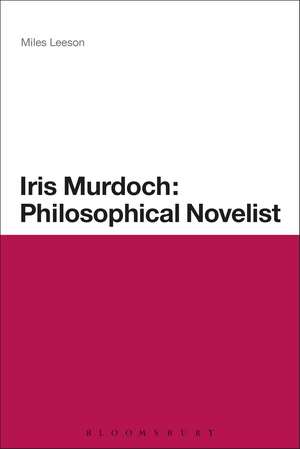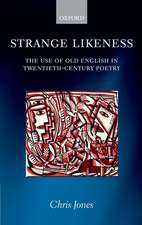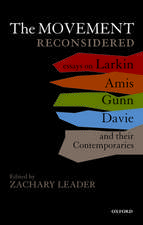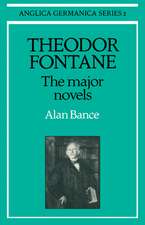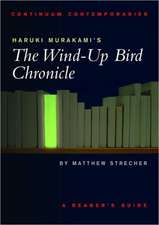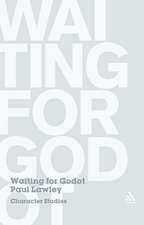Iris Murdoch: Philosophical Novelist
Autor Dr Miles Leesonen Limba Engleză Paperback – 26 oct 2011
This book provides a concise and highly readable reassessment of Iris Murdoch's engagement with philosophy throughout her life and proposes that she was, most importantly, a philosophical novelist.
By investigating her use of philosophical argument in her fictional writing, it becomes clear that her narratives always depend upon a strong metaphysical underpinning. Leeson proceeds thematically through the philosophical phases of Murdoch's life and develops a clear argument that Murdoch reacts against the philosophies of Sartre, Plato, Nietzsche and Heidegger not only in her philosophical writings but also in her fiction. Indeed, it is in her fiction that her philosophical argument is most persuasive and accessible.
This timely study provides new information regarding Murdoch's engagement with Martin Heidegger and also provides a detailed critique of critics who have overlooked Murdoch's engagement with philosophy within her fiction.
By investigating her use of philosophical argument in her fictional writing, it becomes clear that her narratives always depend upon a strong metaphysical underpinning. Leeson proceeds thematically through the philosophical phases of Murdoch's life and develops a clear argument that Murdoch reacts against the philosophies of Sartre, Plato, Nietzsche and Heidegger not only in her philosophical writings but also in her fiction. Indeed, it is in her fiction that her philosophical argument is most persuasive and accessible.
This timely study provides new information regarding Murdoch's engagement with Martin Heidegger and also provides a detailed critique of critics who have overlooked Murdoch's engagement with philosophy within her fiction.
| Toate formatele și edițiile | Preț | Express |
|---|---|---|
| Paperback (1) | 255.11 lei 6-8 săpt. | |
| Bloomsbury Publishing – 26 oct 2011 | 255.11 lei 6-8 săpt. | |
| Hardback (1) | 771.75 lei 6-8 săpt. | |
| Bloomsbury Publishing – 10 feb 2010 | 771.75 lei 6-8 săpt. |
Preț: 255.11 lei
Nou
Puncte Express: 383
Preț estimativ în valută:
48.82€ • 52.20$ • 40.70£
48.82€ • 52.20$ • 40.70£
Carte tipărită la comandă
Livrare economică 18 aprilie-02 mai
Preluare comenzi: 021 569.72.76
Specificații
ISBN-13: 9781441110220
ISBN-10: 1441110224
Pagini: 170
Dimensiuni: 156 x 234 x 9 mm
Greutate: 0.25 kg
Editura: Bloomsbury Publishing
Colecția Continuum
Locul publicării:London, United Kingdom
ISBN-10: 1441110224
Pagini: 170
Dimensiuni: 156 x 234 x 9 mm
Greutate: 0.25 kg
Editura: Bloomsbury Publishing
Colecția Continuum
Locul publicării:London, United Kingdom
Caracteristici
This book contests the established view that Iris Murdoch is not a â?~philosophical novelistâ?T and argues that placing her in this category is essential to understanding her fiction.
Notă biografică
Miles Leeson is Lecturer in English Literature at the University of Portsmouth, UK.
Cuprins
Acknowledgements
1. Introduction
2. Murdoch's earliest work and the Existential
3. A Severed Head: The Impact of Freud and Nietzsche
4. Heidegger and The Time of the Angels
5. The Bell and Platonism
6. The Philosopher's Pupil: A Revision of Ideas?
7. A Wittgensteinian Neo-Platonist: The Green Knight
8. Conclusion
Bibliography
Index
1. Introduction
2. Murdoch's earliest work and the Existential
3. A Severed Head: The Impact of Freud and Nietzsche
4. Heidegger and The Time of the Angels
5. The Bell and Platonism
6. The Philosopher's Pupil: A Revision of Ideas?
7. A Wittgensteinian Neo-Platonist: The Green Knight
8. Conclusion
Bibliography
Index
Recenzii
It is a sign of health in a scholarly community when books arise that challenge its orthodoxies. Such challenge requires bravery of the scholar and meticulous care in arguing for new approaches. Leeson's book is brave and healthy in this way, aiming to open new lines of research and inquiry into Iris Murdoch's novels as, precisely, philosophical novels. Not novels in which philosophy is a motif (the orthodoxy), but in which philosophy is, in fact, done. Recent gestures by other scholars in Murdoch Studies indicate that such a line of counter-criticism has been opened, notably by the work of Bran Nicols and Guy Backus, though not settled. Leeson's book extends that line to firmly establish that Murdoch's novels do philosophy, and to open space for explorations of the depth to which her philosophy is woven into her aesthetic fabric . . . There is much inspiration to be found here, and Leeson has established himself as young scholar of both depth and promise.
